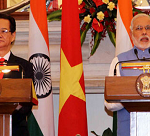Agreements on defence cooperation were an important component of the India-Vietnam bilateral talks during Vietnamese Prime Minister Nguyen Tan Dung’s visit to India from 27-28 October 2014. Sameer Patil, associate national security, ethnic conflict and terrorism fellow at Gateway house, comments on the India-Vietnam defence cooperation.
Statement:
“In September 2014, India had declared its plans to give a $100 million Line of Credit to enable Vietnam to acquire four offshore patrol vessels from India. This acquisition will be an important component of the Vietnam navy’s attempts to modernise its Soviet-era naval force. By acquiring kilo-class submarines from Russia, Vietnam is already on its way to operate the largest and most capable submarine fleet in Southeast Asia. While Vietnam’s naval strength is still asymmetrical compared to the Chinese PLA Navy, acquisition of these naval vessels from Russia will certainly help Vietnam develop a robust counter-intervention capability against China, with whom it has a long standing dispute over parts of the South-China sea.
Additionally, if Vietnam were to acquire BrahMos anti-ship missiles from India, it will be a potent addition to Vietnam’s inventory and make it difficult for China to carry out any activities in Vietnam’s coastal waters. India and Vietnam have also decided to expand cooperation on counter-terrorism issues, which is significant on account of the rise in frequency and severity of piracy related incidents in the South-China sea.
So far, India had maintained a low profile in its engagement with Southeast Asian countries with which China has territorial disputes. Thus, these agreements and attempts to expand defence cooperation with Vietnam will certainly rattle China – especially since China had already warned Vietnam against involving third parties in their territorial disputes.
Earlier this month, the U.S. decided to lift its ban on the sale of lethal weapons to Vietnam, a decision on which China has expressed displeasure. It will therefore be important to observe whether China perceives Vietnam’s proposed acquisition of Indian ships and anti-ship missiles as a direct military intervention by India, and how it chooses to react.”
For more information or interview requests, please contact Reetika Joshi at joshi.reetika@gatewayhouse.in.


